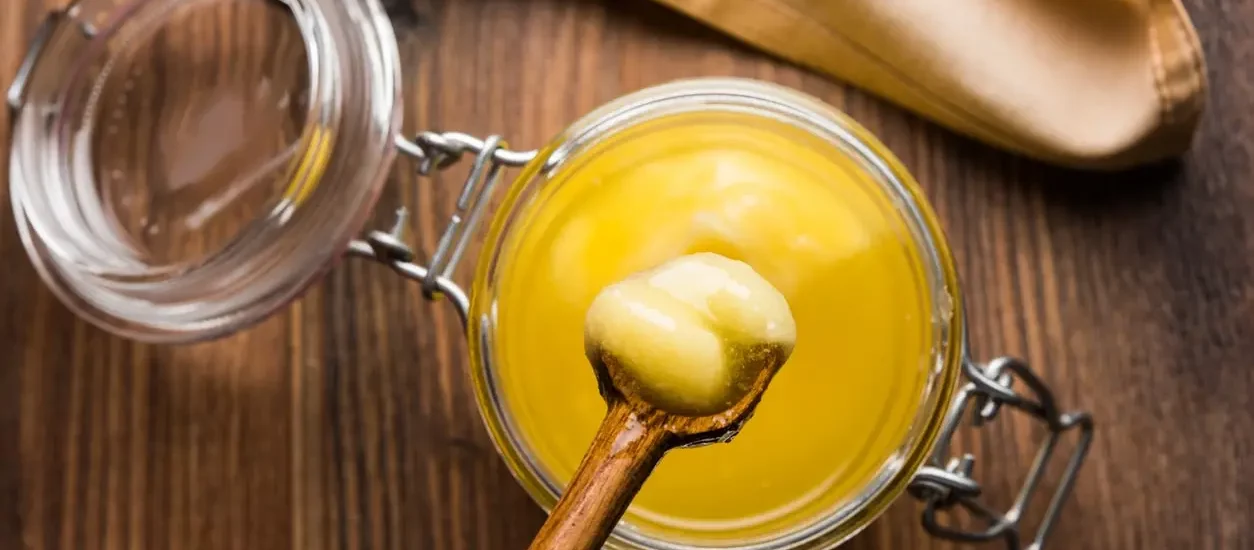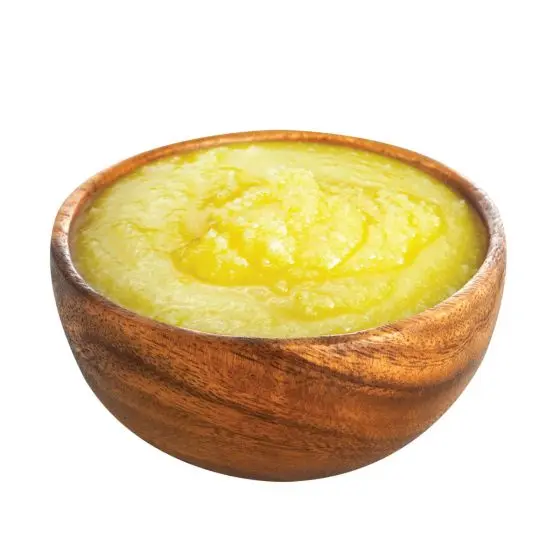

wordpress-seo domain was triggered too early. This is usually an indicator for some code in the plugin or theme running too early. Translations should be loaded at the init action or later. Please see Debugging in WordPress for more information. (This message was added in version 6.7.0.) in /home/sehatnagar.com/public_html/wp-includes/functions.php on line 6114
Ghee, also known as clarified butter, is a traditional food in many cultures, especially in India. However, now it is popular world wide and we used it in almost every cooking dish. We can prepare ghee by simmering butter and removing the milk solids, leaving behind a golden-colored liquid that has a unique nutty flavor. It has been used for centuries as a cooking fat and as a medicinal ingredient in Ayurvedic medicine. In recent years, ghee has gained popularity as a healthier alternative to butter and other cooking oils. In this article, we will explore the topic “Is Ghee Good for Weight Loss” in detail and provide insights into the research behind this claim. So, let’s start by a little introduction to ghee.
Ghee is a very popular ingredient used almost in every cooking dish. Ghee generally categorized into two main types, Desi Ghee & banaspati ghee. However, desi ghee is mostly prepared in homes. People from villages love to have roti smeared in desi ghee. Ghee is made by simmering butter until the milk solids separate from the fat. The liquid is then strained, leaving behind a pure fat that is used for cooking and baking. Ghee is composed mainly of fat, with small amounts of vitamins A, D, E, and K, as well as butyric acid and other fatty acids.
There are several types of ghee available in the market, each contains its unique properties and flavor profile. Here are some common types of ghee:

Ghee is a rich source of nutrients and healthy fats, making it a valuable addition to a balanced diet. Here is the nutritional profile of one tablespoon (14 grams) of ghee:
Ghee is also a good source of healthy fats, including conjugated linoleic acid (CLA) and medium-chain triglycerides (MCTs), which have been associated with various health benefits, such as weight loss, improved heart health, and better brain function. Ghee is also a source of butyrate, a type of short-chain fatty acid that has been shown to have anti-inflammatory properties and can promote gut health.
The idea that fats are bad for weight loss is a common misjudgment. Fats are essential for good health and play a crucial role in maintaining healthy body weight. Healthy fats such as monounsaturated and polyunsaturated fats are good for the body and can even aid in weight loss. They help to keep you feeling full for longer periods and promote satiety, which can prevent overeating.
Ghee is a rich source of healthy fats, including conjugated linoleic acid (CLA), which is a fatty acid that has been shown to promote weight loss in animal studies. CLA has been found to increase the body’s metabolic rate, which can aid in burning calories and reducing body fat. Additionally, ghee is also rich in medium-chain triglycerides (MCTs), which are easily digestible and can be converted into energy rather than stored as fat.
However, it’s important to keep in mind that ghee is a calorie-dense food and should be consumed in moderation. One tablespoon of ghee contains around 120 calories, so it’s important to be mindful of your portion sizes when using ghee in your cooking.
Ghee is also a good source of vitamin K, which plays a vital role in blood clotting and bone health. It also contains vitamin E, which acts as an antioxidant and protects the body against free radicals. Ghee is also rich in butyric acid, which is a short-chain fatty acid that is produced by gut bacteria. Butyric acid has been found to have anti-inflammatory properties and promote gut health.
Ghee can promote weight loss in several ways. Firstly, the high concentration of healthy fats in ghee can help keep you feeling full for longer periods, which can prevent overeating. Secondly, ghee is rich in MCTs, which are easily digestible and can be converted into energy rather than stored as fat. Thirdly, CLA found in ghee has been found to increase the body’s metabolic rate, which can aid in burning calories and reducing body fat.
One of the concerns about ghee is its high content of saturated fat, which has been linked to an increased risk of heart disease. However, recent studies have shown that ghee may not be as harmful to cholesterol levels as previously thought. A study published in the Journal of Lipid Research found that ghee had no significant effect on cholesterol levels when compared to butter or coconut oil. Another study found that ghee reduced LDL (bad) cholesterol levels in rats fed a high-fat diet.
Although ghee may not be as harmful to cholesterol levels as previously thought, it is still a calorie-dense food. Consuming too much of it can lead to weight gain rather than weight loss. It is recommended to consume ghee in moderation as part of a balanced diet that includes other healthy fats, whole grains, fruits, and vegetables.
Ghee is a versatile ingredient that can be used in various ways to promote weight loss. Here are some tips on how to use ghee for weight loss:
Ghee and butter are both made from milk fat, but they have different compositions. However, Ghee contains more healthy fats than butter and has a higher smoke point, making it a healthier option for cooking at high temperatures. Ghee also contains butyric acid, which is not found in butter. However, both ghee and butter are calorie-dense foods and should be consumed in moderation as part of a balanced diet that includes other healthy fats, whole grains, fruits, and vegetables.
In ancient India, wrestlers and athletes would consume a spoonful of Ghee before their matches or competitions for an energy boost. That is because ghee contains medium-chain triglycerides (MCTs), which provide a quick source of energy to the body.
Is Guava Good For Weight Loss?
Does Smoking Cause Weight Loss
Is Lassi Good For Weight Loss? Mysterious Facts
Ghee can be a beneficial addition to a healthy diet, particularly for weight loss. Its high content of healthy fats and vitamins, as well as its ability to promote satiety and boost metabolism, make it a valuable ingredient for those looking to lose weight. While ghee does contain saturated fat, recent studies suggest that it may not be as harmful to cholesterol levels as previously thought. However, consume ghee in moderation as part of a balanced diet that includes other healthy fats, whole grains, fruits, and vegetables. As with any dietary changes, it is always recommended to consult with a healthcare professional before making any significant changes to your diet.
A. Ghee is a type of clarified butter that originated in South Asia. In this process, one simmers butter until the water and milk solids get removed. It results in a nutty, golden liquid. Ghee is different from butter because it has a higher smoke point, a longer shelf life, and is lactose-free.
A. No, Ghee and butter have similar calorie contents as both get made from milk fat. However, Ghee has a higher concentration of healthy fats. In addition, it is more easily digestible due to the removal of milk solids.
A. Ghee is calorie-dense and high in saturated fat, so moderation is essential for weight loss. However, it can get included as part of a balanced diet.
A. Yes, Ghee is high in saturated fat. It is a clarified butter commonly used in South Asian cuisine. It has approximately 60-65% of its saturated fat content.
A. Ghee is high in calories, so moderation is essential for weight loss. Start with 1-2 teaspoons daily and incorporate it into a balanced diet along with a proper exercise routine. Consult with a healthcare provider for personalized recommendations.
A. Yes, one can include Ghee in low-carb or ketogenic diets. It is a high-fat food with no carbs. It can be used as a cooking oil or added to the flavour and healthy fat recipes.
A. Yes, Ghee is often suitable for people with lactose intolerance. During the clarification process, the lactose in milk gets removed, making Ghee lactose-free. However, it is always best to consult a health expert to determine what is safe for your dietary needs.
A. Moderation is crucial. Use Ghee in small amounts to avoid excess calorie intake. Replace unhealthy fats with Ghee, such as using them for cooking instead of vegetable oil or butter. Avoid consuming Ghee with high-calorie foods and pair it with healthy options like veggies or whole grains. Be mindful of your overall calorie intake and maintain a balanced diet while incorporating Ghee for weight loss.
A. Ghee can be used as a cooking oil substitute for weight loss. Ghee is high in healthy fats and has a high smoke point, making it a good choice for cooking at high temperatures. It is also rich in conjugated linoleic acid (CLA), healthy fats, vitamins, and antioxidants. Its high smoke point also makes it ideal for frying and sautéing. However, like all oils, one can use it in moderation as it is calorie-dense. A balanced diet and regular exercise are crucial for weight loss.
A. Ghee has healthy fats and is often used for weight loss but has high calories. So, it would be best if you eat it in moderation. Overeating Ghee can make you gain weight and cause health problems. Before adding Ghee to your weight loss plan, consider your dietary needs and any health issues you already have.
There is no scientific evidence to suggest that ghee specifically burns belly fat. However, incorporating ghee as part of a balanced diet can certainly help with weight loss, including reducing belly fat. Ghee is a rich source of healthy fats, including conjugated linoleic acid (CLA) and medium-chain triglycerides (MCTs), which have been associated with various health benefits, such as weight loss and improved body composition. Additionally, ghee can help promote satiety and prevent overeating, as the high concentration of healthy fats in ghee can keep you feeling full for longer periods. Overall, consuming ghee in moderation as part of a healthy and balanced diet can support weight loss efforts, including reducing belly fat.
The timing of consuming ghee for weight loss is not as important as the amount and frequency. Ghee is a calorie-dense food and consuming too much of it can lead to weight gain. Therefore, it is important to consume ghee in moderation as part of a balanced diet to reap its nutritional benefits without consuming excessive amounts of calories.
It is generally recommended to limit the consumption of ghee to 1-2 tablespoons per day, depending on your calorie needs and dietary preferences. You can incorporate ghee into your diet by using it for cooking or as a topping for your meals.
Ghee is a calorie-dense food, which means it is high in calories. Consuming excessive amounts of ghee can lead to weight gain, which may result in an increase in body fat. However, consuming ghee in moderation as part of a balanced diet is not likely to increase body fat. In fact, ghee contains healthy fats, such as conjugated linoleic acid (CLA) and medium-chain triglycerides (MCTs), which can promote weight loss and improved body composition. Therefore, it is important to consume ghee in moderation as part of a healthy and balanced diet to reap its nutritional benefits without consuming excessive amounts of calories.
What happens if we eat ghee daily?
While it can be beneficial for weight and heart health when consumed in healthy amounts, too much ghee on a regular basis can contribute to an increased risk for heart disease and weight gain. Be careful and use moderation when you incorporate ghee into your regular diet.